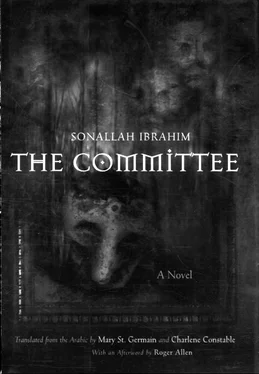We went to the kitchen and I made tea. There were only three eggs in the fridge. After asking my guest's preference, I put them on the stove in a little water. I also took out a piece of cheese, another of sesame halva, and some black olives.
We finally sat down facing each other across the dining table. I offered him two boiled eggs out of the three and conferred the third on myself. He didn't comment on this unequal apportionment, but instead applied himself to his food with great relish, whereas I just picked at mine.
We soon finished eating. I poured the tea. My newspapers came, delivered by the vendor as usual to the front doorstep. I gave Stubby one and kept the other.
Lately I had developed the habit of combining four activities: drinking tea, smoking my first cigarette, reading the daily paper, and attending to a bodily need. I'd gotten into this habit when I began my research on the Doctor. I had had to cut down the time between getting up and leaving my apartment in order to spend as much time as possible at the publishing houses of the newspapers and magazines whose libraries I haunted. However, this custom was rooted in an instinctive sense of the appropriate place to read our national newspapers. Like all habits, it came to be a cornerstone of my daily mental routine. Whenever I relinquished it or deviated from it even slightly, my whole day was ruined right from the start.
I didn't feel there was anything preventing me from following my routine that day, especially since I was in more need than ever of all my mental faculties, as well as of whatever time alone I could get. I put my pack of cigarettes and my matches in my pocket, tucked the paper under my arm, picked up my cup, and went along to the bathroom.
I expected him to follow me like always, and so he did. I set my cup on the edge of the sink and confronted him, explaining what I had in mind and how it was contingent on closing the door.
He looked at me derisively, "Have you forgotten I saw your bare backside under conditions less dignified than answering a call of nature?"
"I haven't forgotten. But it's customary for a person to tend to this business by himself. This is a very private moment."
He said maliciously, "If you must wave other peoples' dirty laundry in public, can you expect to wash your own in private?"
Having determined the attempt was futile, I pulled down my pants and sat on the plastic toilet seat. He stood in the doorway watching me.
I picked up my teacup, took a couple of sips, then put it on the floor by my feet. I took out a cigarette and lit it. Then I unfolded the paper and began with the headlines.
But the usual harmony of the morning didn't de velop. Neither the tea nor the cigarette had any flavor and I couldn't concentrate on reading. More important than all that, my bowels wouldn't move.
I had no hope of making any progress by staying in this position. I got up, pulled my pants up quickly, and headed for the bedroom, feeling deeply depressed and frustrated. I sat at my desk while he occupied the armchair.
I lit a new cigarette and reached for the index cards filed in the shoebox. Feeling Stubby's gaze on my face, I began leafing through them.
I had to find some method that would satisfy and be sanctioned by the Committee so I could continue the research I had begun. Could this be done by eliminating certain parts of his biography? Or by restricting my approach to a single aspect of his rich personality? And what would that aspect be? Or should I completely abandon the novel program I had proposed to the Committee and instead employ a traditional biographical format?
The harder I thought the more hopeless I felt. The traditional format was fraught with the grave dangers I had alluded to at the time. On the other hand, it made the connections between aspects of his career and personality clear, so much so that it would be difficult to deal with the two separately.
How is it possible to speak of wealth without alluding to its source? And too, if I ignored the related facts, I would violate the basic principle that Balzac crystalized in his celebrated maxim: "Behind every great fortune is a great crime," which has since become a premise of all modern researchers.
Likewise, it was not possible for me to disregard his humble origin, or his patriotic role and connections with the revolution, or his appeal for Arab unity, socialism, or his diverse economic activities, or his brokering for foreign companies and the international awards he won for this, or his greed for the Gulf petroleum wealth, which goes to its real owners in Europe and the United States via other middlemen. What would be left of him if I did?
Stubby suddenly addressed me in a friendly manner, seemingly uninterested, "Incidentally, yesterday I heard you speak about the important discoveries you had arrived at in your studies on the Doctor. If my memory doesn': fail me, you said you could tear the veil from many mysteries. What did you mean?"
I sensed danger and tried to avoid answering.
I said nonchalantly, "In fact, I haven't yet come up with anything. What I meant to say, and perhaps I didn't express myself accurately, is that I'm on the brink of understanding the relationships between a number of miscellaneous phenomena."
"Such as?"
I thought a bit, then said, "The phenomena are many, innumerable, so that it is difficult to choose only one of them. Take, for example, the spread of the maladies of mental depression, sexual impotence, apathy, religious fanaticism, the extinction of the Egyptian cigarette, or the return of Coca-Cola. Wherever you look you will find the phenomenon you want."
I smiled and added, "Indeed, the Doctor himself provides us with one of the most provocative and inexplicable phenomena. By that I mean the presence of many like him in each Arab nation, in spite of disparate social and political systems, characteristics, and laws."
He ignored my reference to the Doctor and shook his head scornfully, "And where is this alleged relationship between the phenomena?"
Cunningly, I answered, "I didn't say I'd discovered it. I'm only beginning my research."
Enunciating every syllable, he said emphatically, "I see you're chasing a mirage, imagining something that doesn't exist, for how does an ordinary study like the one you're doing lead up to all these matters?"
I banged the desktop and said, "This is what I con stantly keep repeating to myself to no avail… What would you think about a cup of coffee?"
He was surprised at the change of subject, but quickly said, "I have no objection."
Then he looked at his watch and corrected himself, "Better if I don't. It's nearly dinnertime."
I got up and said brightly, "Unfortunately I wasn't expecting this visit, so I didn't prepare for it. Actually, I have enough rice, but as for the fridge… Well, I believe there's at least half a chicken, but then again one has to fix some side dishes. Something like soup and some kind of meat or fish dish, another of vegetables, to say nothing of fruit and desert. Thus, you see, I have to go-I mean-we have to go to the market."
He said, propelling me toward the kitchen, "Don't bother. We'll make do with what you have on hand."
I shrugged my shoulders as if to absolve myself of responsibility, took the half chicken out of the freezer, and put it in some water to thaw. I lit a burner under a pan of water, cleaned the chaff out of the rice, and poured the hot water over it, reserving enough for the cup of coffee I so badly needed.
I washed the rice thoroughly in hot water and transferred it to another pan. I added butter, salt, and a little liquid, then put it back on the heat. Going back to the fridge, I took out tomatoes, cucumbers, and green pep pers, then opened the utensil drawer located under the burner to look for a clean knife. I only found a large, sharp butcher knife. I closed the drawer on it and took a couple of sips of coffee. My companion stood in the doorway of the kitchen, dividing his attention between keeping an eye on me and scanning the titles of the books arranged in rows running from the kitchen to the bathroom. I asked him to pour me some water so I could wash the paring knife.
Читать дальше











